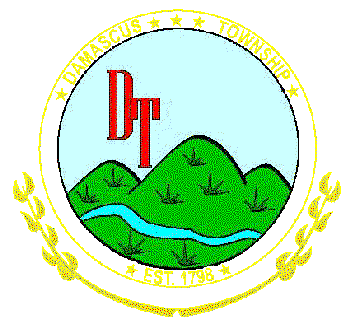
WAYNE COUNTY, PENNSYLVANIA
60 CONKLIN HILL ROAD, DAMASCUS, PA 18415

 |
WAYNE COUNTY, PENNSYLVANIA 60 CONKLIN HILL ROAD, DAMASCUS, PA 18415 |
 |

NEWS ITEMS COURTESY OF THE PENNSYLVANIA TOWNSHIP NEWS
MAGAZINE
PRESENTED BY THE DAMASCUS TOWNSHIP BOARD OF SUPERVISORS
Success of Census Is in Your Hands
Our
Township Benefits When Everyone Participates
It has only 10 questions and takes only 10 minutes to answer.
What could be so easy? Census 2010, of course.
In a few short weeks, the official form will arrive in the mail. Hopefully, once you have the facts and understand what is at stake for you, your neighbors, our township, and Pennsylvania, you will pick up a pencil, fill out the questionnaire, and return it to the U.S. Census Bureau.
Because the truth is, your involvement really does matter and will determine if the commonwealth and communities like ours gain, or lose, in Census 2010.
What's the big deal?
Every decade, for 220 years, the
federal government has been attempting to count every man, woman, and child
living in the United States - all 390 million of them. Sure, the census is a
complex, nationwide effort, but it's also a local, grassroots event, and its
ultimate success or failure hinges on one factor: participation.
Still, what's the big deal if the U.S. Census Bureau misses a
person or two?
Well, Pennsylvania and its municipalities stand to lose two
critical things, money and political power, if the commonwealth fails to achieve
a full and accurate count in the weeks ahead.
Census 2010, like others before it, will determine how more than $400 billion in federal funding is allocated each year to communities nationwide. This money helps to support such things as local roads and bridges, emergency services, recreation and economic development programs, schools, job training, senior centers, and hospitals.
Our township, along with the rest of the state, could be short-changed tens of thousands of dollars for every person who isn't counted. In fact, researchers have estimated that 102,000 Pennsylvania residents were overlooked during Census 2000, a number equal to the populations of Altoona and Lancaster combined.
The federal government also relies on census numbers to determine how many legislators and how much political clout each state will have in the U.S. House of Representatives. With only 435 seats up for grabs, the competition is fierce.
Georgia, for instance, tracked down people during Census 2000 that would have otherwise been overlooked and gained two House seats. Meanwhile, Pennsylvania has seen its representation in the House dwindle from 36 representatives in 1920 to 19 in 2000. And if it's not careful this time around, the commonwealth could lose another congressional seat.
Closer to home, the census has an impact on state and local politics, too. Population numbers determine the legislative boundaries for members of Pennsylvania's General Assembly and help to establish where the lines for local election districts will be drawn.
In addition, demographic data collected through the relatively new American Community Survey, a census offshoot that has replaced the long form of years past, defines who we are as a nation, as a state, and as a community - namely, how and where we are living, what our age, income, and ethnicity is, and how the population is changing.
Of course, this information is helpful to state and federal policymakers, who rely on it to develop programs to reduce unemployment, expand low-income housing, and stimulate economic growth, but our township benefits from the data, too. Accurate information about who is living in our community helps the township supervisors make informed decisions, whether it's about recreation or building a new road.
Cautious but cooperative
Still, people continue to be
skeptical about the census. They worry that their personal information will fall
into the wrong hands or that the census is an attempt by the government to keep
close tabs on them.
While township residents should be cautious to protect themselves against scams and con artists during Census 2010, they should also be cooperative with census workers, who will only visit your home if you do not return the 10-question form by April 1, National Census Day. Census forms, which come with postage-paid envelopes, will start arriving in mailboxes in mid-March.
Field representatives must carry an identification badge with a U.S. Department of Commerce watermark and an expiration date. They may also have a bag with a Census Bureau logo. Census workers will not be asking for credit card, bank account, or Social Security numbers. Residents should be wary of anyone who does and report him immediately to the township and law enforcement.
A sample census form can be found at www.2010.census.gov by clicking on the "How It Works" tab. The questions, which have nothing to do with a family's income, job status, or citizenship, are basic and focus on how many people are living in a home, their date of birth, race, and gender. The form also asks if you rent or own your home and requests a telephone number in case the Census Bureau does not understand an answer.
'Good for your community'
The bottom line is that the
process is safe and confidential.
According to the Census Bureau, the information gathered is used to produce statistics only. Your answers, it stresses, cannot be used against you by any government agency or court. In fact, bureau employees must take an oath of nondisclosure and are sworn for life to protect the data's confidentiality. Under federal law, violators face fines of up to $250,000 and five years in jail.
"Filling out the form will not increase your chances of getting called for jury duty; it will not mean that immigration agents will show up at your door; and no one will come looking for you for unpaid parking tickets," Gov. Ed Rendell said recently. "In fact, the census asks for less personal information than does a typical credit card application. The bottom line is that answering the questions is completely safe and good for your community."